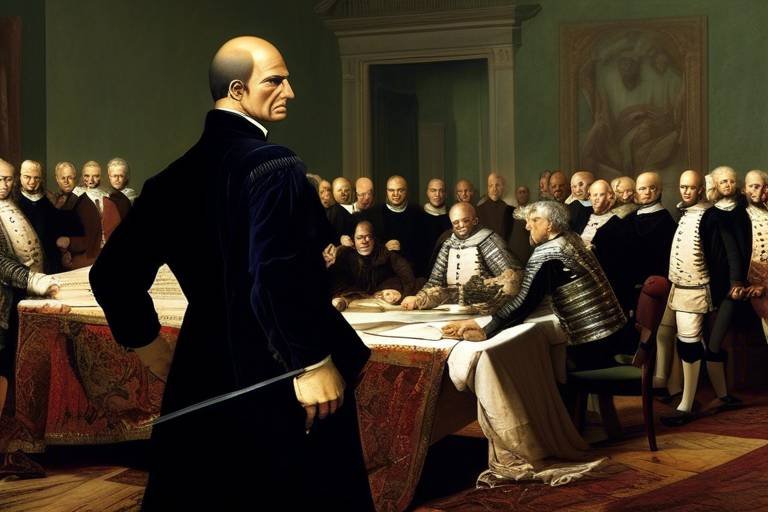The Power Game - Machiavellian Philosophy in Practice
The intricate dance of power has been a captivating subject throughout history, and no one has dissected it quite like Niccolò Machiavelli. His works, particularly "The Prince," have sparked debates and discussions that echo through the ages, making his philosophy a cornerstone in understanding the dynamics of leadership and authority. In a world where the stakes are high and the competition is fierce, the principles laid out by Machiavelli offer not just a glimpse into the past but also a roadmap for navigating the complexities of modern life. Whether in politics, business, or personal relationships, understanding the nuances of Machiavellian philosophy can provide a significant edge in the power game.
To truly grasp the essence of Machiavelli's ideas, we must first dive into the historical context of Renaissance Italy. This was a time of political upheaval, with city-states like Florence embroiled in constant power struggles. Machiavelli, born in 1469, witnessed firsthand the tumultuous shifts in governance and the often brutal tactics employed by leaders to secure their positions. His experiences as a diplomat and political advisor allowed him to observe the intricacies of power dynamics, leading him to formulate his theories. In this backdrop, Machiavelli's thoughts emerged not merely as philosophical musings but as practical guidelines for those aspiring to wield power effectively.
At the heart of Machiavelli's philosophy are several key concepts that illuminate the path to effective leadership. Among these, virtù and fortuna stand out as essential elements. Virtù encompasses the qualities and skills that enable a leader to shape their destiny, highlighting the importance of adaptability and strategic thinking. In contrast, fortuna represents the unpredictable nature of luck and chance in political affairs. Together, these concepts underscore the necessity for leaders to be both proactive and reactive, navigating the ever-changing landscape of power with a keen understanding of human nature.
Virtù is not merely about virtue in the moral sense; it refers to the strength and skill of a leader to influence outcomes. A leader with virtù is like a skilled chess player, anticipating moves and countering threats before they materialize. This quality involves a blend of intelligence, decisiveness, and the ability to inspire loyalty among followers. In today's fast-paced world, the leaders who thrive are those who can adapt their strategies based on the circumstances they face, much like a chameleon changing its colors to blend into its environment.
Machiavelli famously asserted that the ends often justify the means. This pragmatic approach to leadership suggests that effective leaders prioritize results over moral considerations. In a world where idealism can lead to stagnation, Machiavelli's philosophy encourages leaders to embrace a more realistic view of governance. This doesn’t mean abandoning ethics altogether, but rather recognizing that sometimes tough decisions must be made for the greater good. The ability to balance ethical considerations with pragmatic decision-making is what separates successful leaders from the rest.
While the idea of manipulation and deception may sound nefarious, Machiavelli viewed these tactics as necessary tools in the arsenal of a leader. In his view, leaders must sometimes engage in cunning strategies to maintain their authority and achieve their goals. This could involve anything from crafting a favorable public image to outmaneuvering rivals. After all, in the game of power, those who fail to adapt may find themselves outplayed. It’s a reminder that in the pursuit of power, a bit of cunning can go a long way.
Fortuna, or fortune, plays a pivotal role in the Machiavellian landscape. It represents the unpredictable elements that can influence a leader's success or failure. Just as a storm can change the course of a ship at sea, unforeseen circumstances can alter the trajectory of political ambitions. Machiavelli emphasized the importance of being prepared for these twists of fate, advocating for a flexible approach to leadership. The leaders who succeed are those who can ride the waves of fortune, adjusting their sails as needed to navigate through turbulent waters.
Fast forward to the present, and Machiavellian principles remain strikingly relevant. In contemporary politics, we often see leaders employing Machiavellian tactics to consolidate power, navigate alliances, and manage public perception. These strategies are not just confined to the political arena; they extend into the corporate world as well. Business leaders who understand the nuances of negotiation and strategic decision-making often find themselves at a competitive advantage. In a landscape where every decision counts, the ability to apply Machiavellian principles can spell the difference between success and failure.
Political leaders frequently utilize Machiavellian tactics to achieve their goals. This includes forming alliances, manipulating public opinion, and sometimes even engaging in underhanded strategies to outsmart opponents. The enduring influence of Machiavelli is evident in how modern politicians navigate the complex web of power dynamics, often mirroring the strategies he outlined centuries ago.
In the corporate realm, Machiavellian strategies can be incredibly effective. Leaders who harness negotiation tactics and strategic decision-making often find themselves leading their organizations to new heights. Understanding the motivations of others, leveraging relationships, and making calculated risks are all part of the Machiavellian playbook. In a world where competition is fierce, the ability to think like a Machiavellian can provide a significant edge.
- What is Machiavellian philosophy? Machiavellian philosophy focuses on the pragmatic aspects of power, emphasizing the importance of cunning, strategy, and adaptability in leadership.
- How can Machiavellian principles be applied in modern life? These principles can be applied in various fields, including politics and business, where strategic maneuvering and understanding human nature are crucial for success.
- Is Machiavellianism always negative? While often associated with manipulation, Machiavellianism can also represent strategic thinking and effective leadership when applied ethically.

The Origins of Machiavellian Thought
The roots of Machiavellian thought can be traced back to the tumultuous political landscape of Renaissance Italy, a period characterized by intense power struggles, shifting alliances, and the emergence of city-states vying for dominance. During this time, Italy was not a unified nation but a collection of fragmented territories, each ruled by various princes, republics, and external powers. This chaotic environment provided the perfect backdrop for Niccolò Machiavelli to develop his revolutionary ideas on power and governance.
Machiavelli, born in 1469 in Florence, was deeply influenced by the political instability surrounding him. His experiences as a diplomat and political advisor exposed him to the intricate workings of power dynamics and the often brutal tactics employed by leaders to maintain control. In his seminal work, The Prince, written in 1513, Machiavelli presented a pragmatic approach to leadership that broke away from the idealistic views of his predecessors. Rather than focusing on morality and virtue, he emphasized the necessity of being shrewd and calculating in the pursuit of power.
To understand Machiavelli's philosophy, it’s essential to consider the context in which he wrote. The Medici family, who ruled Florence, were notorious for their cunning political maneuvers and ruthless tactics. Machiavelli observed how leaders like Cesare Borgia navigated the treacherous waters of politics, often employing manipulation and deceit to achieve their goals. This led him to conclude that, in politics, the ends often justify the means. The stark reality of power struggles during his time shaped his belief that a successful leader must be willing to set aside ethical considerations in favor of pragmatic decision-making.
Moreover, Machiavelli's ideas were not merely a reflection of his environment; they also served as a guide for future leaders. His work offered a blueprint for political strategy that transcended his era, influencing countless rulers and thinkers throughout history. For instance, his concepts of virtù (the ability to shape one’s destiny) and fortuna (the role of chance) became foundational elements in discussions about leadership and power dynamics. Understanding these concepts is crucial for anyone looking to grasp the essence of Machiavellian philosophy.
In summary, the origins of Machiavellian thought are deeply intertwined with the historical context of Renaissance Italy. The political chaos, the rise and fall of powerful families, and Machiavelli's personal experiences all contributed to the development of his theories. His emphasis on pragmatism over idealism, manipulation over morality, and the interplay between skill and luck continues to resonate in modern discussions of power and governance.
- What is Machiavellian philosophy? Machiavellian philosophy focuses on the pragmatic and often ruthless strategies leaders use to gain and maintain power, emphasizing the importance of results over ethics.
- Who was Niccolò Machiavelli? Niccolò Machiavelli was an Italian diplomat, philosopher, and writer of the Renaissance era, best known for his work The Prince, which outlines his views on political power.
- How does Machiavelli's thought apply today? Machiavellian principles are still relevant in modern politics and business, where strategic maneuvering and understanding human nature are critical for success.

Key Concepts in Machiavelli's Philosophy
Machiavelli's philosophy is rich with ideas that have shaped political thought for centuries. At its core, it revolves around the understanding of power dynamics and the various factors that influence a leader's ability to maintain authority and achieve their goals. Two of the most critical concepts in Machiavelli's work are virtù and fortuna, which serve as the foundation for his views on leadership and governance.
Virtù is not merely a measure of moral virtue; instead, it encapsulates a leader's skill set, adaptability, and strategic thinking. Think of it as a toolbox filled with essential tools that a leader must wield effectively to navigate the turbulent waters of politics and power. A leader with high virtù can influence events, shape outcomes, and ultimately control their destiny. This concept emphasizes that being a successful leader requires more than just good intentions; it demands a pragmatic approach to the complexities of human behavior and societal structures.
In essence, virtù is about the qualities that enable a leader to respond to challenges adeptly. It encompasses traits such as decisiveness, intelligence, and the ability to inspire loyalty among followers. For instance, a leader facing a crisis must possess the virtù to make swift decisions that might not always align with traditional ethical norms but are necessary for survival. This adaptability is crucial, as the political landscape is ever-changing, and leaders must be prepared to pivot their strategies at a moment's notice.
Machiavelli clearly advocates for a pragmatic approach to leadership. He argues that effective leaders often prioritize results over moral considerations. This doesn't mean that they should abandon ethics altogether; rather, they should recognize that the harsh realities of governance sometimes require tough choices. A leader who clings to idealism may find themselves outmaneuvered by more pragmatic opponents. In Machiavelli's world, success is the ultimate measure of a leader's worth, and sometimes that means making sacrifices along the way.
Furthermore, Machiavelli does not shy away from discussing the role of manipulation and deception in politics. He posits that, at times, leaders must engage in cunning tactics to maintain their authority and achieve their objectives. This idea can be unsettling, but it reflects the harsh truths of power dynamics. For example, a leader might need to create a false narrative to unite their followers or to undermine an opponent. While this may seem morally ambiguous, Machiavelli argues that the end often justifies the means when it comes to preserving one's power and ensuring the stability of the state.
On the flip side, the concept of fortuna plays a crucial role in Machiavelli's philosophy as well. Fortuna represents the unpredictable nature of luck and chance in political affairs. While a leader may possess virtù, they must also be prepared for the whims of fortune, which can drastically alter the course of events. This duality of control and chaos is what makes the study of Machiavelli so fascinating. Leaders must be vigilant, ready to adapt their strategies based on the ever-changing circumstances that fortune presents.
In conclusion, understanding these key concepts of virtù and fortuna is essential for anyone looking to navigate the complexities of power dynamics, whether in politics, business, or personal relationships. Machiavelli's insights remind us that while we may strive for ethical leadership, the realities of human nature often demand a more nuanced approach.
- What is Machiavelli's most famous work? Machiavelli's most renowned work is "The Prince," which outlines his views on political leadership and power.
- Does Machiavelli advocate for unethical behavior? While Machiavelli discusses manipulation and deception, he emphasizes pragmatism and the need for leaders to make tough decisions for the greater good.
- How can Machiavelli's principles be applied today? Machiavelli's insights can be applied in various fields, including politics and business, where understanding human nature and strategic thinking are crucial for success.

Virtù: The Skillful Leader
When we talk about virtù, we're diving into one of the most fascinating concepts in Machiavelli's philosophy. It's not just about being virtuous in the moral sense; instead, it represents the skillset and qualities that empower a leader to take control of their fate. Imagine a captain steering a ship through turbulent waters—this captain must possess not only knowledge of the sea but also the ability to adapt to changing conditions. Similarly, a leader must exhibit qualities that allow them to navigate the unpredictable currents of power dynamics.
At its core, virtù encompasses a range of attributes that contribute to effective leadership. These include:
- Adaptability: The ability to adjust strategies based on circumstances.
- Strategic Thinking: A knack for foreseeing potential challenges and opportunities.
- Decisiveness: The courage to make tough decisions swiftly.
- Charisma: The power to inspire and influence others.
In the world of leadership, possessing virtù is akin to having a toolkit filled with essential tools. Each tool represents a skill that can be deployed when the situation demands it. For instance, a leader facing a crisis must quickly assess the situation, decide on a course of action, and rally their team to execute that plan. This is where the concept of virtù shines—it's about being prepared and equipped to handle whatever comes your way.
Moreover, virtù is not a static quality; it evolves with experience and context. A leader who has faced various challenges will develop a deeper understanding of their strengths and weaknesses, allowing them to refine their approach. This evolution is crucial in maintaining authority and effectiveness in a constantly changing environment. Just as a seasoned athlete learns from each game, a leader must learn from every experience to enhance their virtù.
However, it's essential to recognize that virtù also requires a certain level of self-awareness. Leaders must understand their own capabilities and limitations, as well as the dynamics of the environment in which they operate. This awareness allows them to leverage their strengths while compensating for any weaknesses. Think of it like a chess game; a skilled player knows not only their pieces but also their opponent's strategies. This understanding is vital for outmaneuvering rivals and maintaining a competitive edge.
In conclusion, virtù embodies the essence of what it means to be a skillful leader. It's about embracing adaptability, honing strategic thinking, and cultivating the charisma that draws people in. The journey to developing virtù is ongoing, requiring leaders to remain vigilant and committed to growth. After all, in the grand game of power, those who can master the art of virtù are the ones who ultimately shape their destinies.
- What is virtù in Machiavellian philosophy?
Virtù refers to the qualities and skills that enable a leader to effectively navigate power dynamics and shape their destiny. - How can leaders develop virtù?
Leaders can develop virtù through experience, self-awareness, adaptability, and continuous learning from their successes and failures. - Is virtù only about being cunning?
No, while cunning is a part of virtù, it also includes qualities like decisiveness, charisma, and strategic thinking.

Pragmatism Over Idealism
When it comes to leadership, pragmatism often takes center stage, especially in the world of Machiavellian philosophy. Machiavelli believed that the complexities of power require a leader to be grounded in reality rather than caught up in lofty ideals. Imagine a ship navigating through turbulent waters; a captain who clings to the idea of a perfect journey may find themselves wrecked on the rocks, while one who adjusts their sails to the winds will steer their crew to safety. This analogy perfectly encapsulates the essence of Machiavelli's pragmatic approach.
In his view, the ends often justify the means. This doesn't mean that leaders should abandon their moral compass completely; rather, they should be willing to make tough decisions that prioritize the overall success of their goals. For instance, a leader might find it necessary to form alliances with less-than-ideal partners to achieve a greater good. It's about striking a balance between moral considerations and practical outcomes. This is where the concept of virtù comes into play, allowing leaders to harness their skills and adaptability in the face of challenges.
Consider the political landscape today. Leaders frequently face dilemmas where sticking to idealistic principles could lead to failure. A pragmatic leader, however, would assess the situation and make calculated moves. This might involve negotiating with opponents or even compromising on certain values to secure a more significant benefit. The reality is that power dynamics are often messy, and those who can navigate this chaos with a clear, pragmatic mindset are more likely to thrive.
Moreover, pragmatism encourages leaders to be flexible and open to change. The world is in constant flux, and rigid adherence to ideals can be a recipe for stagnation. By embracing a pragmatic approach, leaders can pivot as needed, responding to new information and shifting circumstances. This adaptability is crucial in maintaining authority and influence in both political and business arenas.
To illustrate the contrast between pragmatism and idealism, let's consider a simple table:
| Aspect | Pragmatism | Idealism |
|---|---|---|
| Decision Making | Results-oriented, flexible | Principle-oriented, rigid |
| Leadership Style | Adaptive, strategic | Visionary, theoretical |
| Response to Challenges | Quick, calculated | Slow, contemplative |
In conclusion, embracing pragmatism over idealism is a cornerstone of effective leadership in Machiavellian thought. It empowers leaders to navigate the treacherous waters of power dynamics with a clear focus on results. By prioritizing practical outcomes and remaining adaptable, leaders can ensure their survival and success in an ever-changing landscape.
- What is the main difference between pragmatism and idealism? Pragmatism focuses on practical outcomes and flexibility, while idealism emphasizes principles and theoretical ideals.
- How can leaders apply Machiavellian principles today? Leaders can use strategic thinking, adaptability, and a results-oriented approach to navigate complex power dynamics.
- Is it ethical to prioritize pragmatism over idealism? While it can be contentious, many argue that pragmatic decisions can lead to better outcomes for the greater good.

Manipulation and Deception
In the realm of power dynamics, manipulation and deception are often viewed as taboo subjects, yet they play a crucial role in the Machiavellian philosophy of leadership. Machiavelli himself argued that a ruler must not only be a master of strategy but also a cunning tactician, adept at navigating the murky waters of human emotions and motivations. This doesn’t mean that leaders should be outright dishonest; rather, they should understand that the perception of truth can be as powerful as the truth itself. Think of it like a magician performing a trick. The audience is captivated not by the actual mechanics of the trick but by the illusion created. Similarly, in politics and business, a well-crafted narrative can be more effective than raw honesty.
Consider the modern political landscape, where leaders often engage in spin—a form of manipulation that shapes public perception to their advantage. This can involve exaggerating achievements, downplaying failures, or even creating entirely false narratives to rally support or discredit opponents. For instance, during election campaigns, candidates frequently use carefully curated images and sound bites to craft a favorable public persona, while their opponents are often portrayed in a negative light. This strategic manipulation is not merely about lying; it’s about controlling the narrative and influencing how people perceive reality.
Moreover, deception can also manifest in more subtle ways. A leader might choose to withhold information or present it selectively, steering conversations in a direction that benefits their agenda. This is akin to a chess player who sacrifices a pawn to gain a strategic advantage. The pawn may seem insignificant, but its sacrifice can lead to a winning position. In business, leaders might employ similar tactics during negotiations, using strategic ambiguity to keep their competitors guessing and off-balance.
However, it’s essential to balance manipulation and deception with ethical considerations. While Machiavelli endorsed these tactics, he also recognized that leaders must maintain a certain level of respect and trust among their followers. If manipulation becomes too blatant, it risks backfiring, leading to a loss of credibility and support. Therefore, successful leaders often walk a fine line, using deception judiciously and ensuring that their actions align with their long-term goals.
In summary, manipulation and deception are integral to the Machiavellian approach to leadership. They require a keen understanding of human psychology, a strategic mindset, and an ability to craft compelling narratives. As we navigate our own power dynamics—whether in politics, business, or personal relationships—it’s crucial to recognize the role these tactics play and to wield them responsibly.
- What is Machiavelli's view on manipulation? Machiavelli believes manipulation is a necessary tool for leaders to maintain power and influence.
- Can manipulation be ethical? While manipulation can be seen as unethical, it can also be used strategically to achieve positive outcomes, as long as it doesn’t compromise trust.
- How can leaders balance manipulation and honesty? Successful leaders often use manipulation subtly, ensuring that they maintain credibility while achieving their goals.
- What are some examples of manipulation in politics? Political campaigns often involve spin, selective information sharing, and creating narratives that favor one candidate over another.

Fortuna: The Role of Chance
In the intricate tapestry of power dynamics, Fortuna plays a pivotal role, acting as both a friend and foe to leaders throughout history. Imagine a game of chess, where every move you make is calculated, yet the outcome can still hinge on an unexpected twist. This is the essence of Fortuna—an unpredictable force that can elevate or undermine even the most astute strategists. Machiavelli recognized that while skill and cunning are fundamental, the whims of fate can dramatically alter the course of events. Leaders must not only be prepared to seize opportunities when luck strikes but also to navigate challenges when fortune turns against them.
To illustrate the dual nature of Fortuna, consider the following scenarios:
- Fortune Favors the Bold: A leader may take a significant risk—like entering a new market—hoping that their gamble will pay off. If successful, they gain a competitive edge and increase their power.
- Unforeseen Setbacks: Conversely, a sudden economic downturn or a scandal can derail even the most well-laid plans, reminding us that control over outcomes is often an illusion.
Machiavelli's insights into Fortuna emphasize the need for leaders to cultivate a mindset of adaptability. Just as a sailor adjusts their sails to the changing winds, a leader must be ready to pivot and respond to the unpredictable nature of events. This adaptability is not merely reactive; it is proactive. Leaders who recognize the role of chance can better prepare themselves by developing contingency plans and cultivating relationships that can provide support during turbulent times.
Moreover, the relationship between skill and chance can be likened to a dance. While one partner (skill) leads with precision, the other (chance) can introduce spontaneity, creating a dynamic interplay. Leaders who understand this dance can leverage their skills while remaining open to the surprises that Fortuna may bring. This balance is crucial in maintaining power and influence in any arena, whether it be politics, business, or personal relationships.
Ultimately, embracing the role of Fortuna means acknowledging that while we can strategize and prepare, there will always be elements beyond our control. The wise leader learns to navigate this uncertainty with grace, turning potential setbacks into opportunities for growth. In a world where the only constant is change, the ability to adapt and thrive amidst the unpredictable is a hallmark of true leadership.
Q1: How can leaders prepare for the unpredictability of Fortuna?
A1: Leaders can prepare by developing flexible strategies, maintaining strong networks, and fostering a culture of adaptability within their organizations. This way, they can respond effectively to unexpected challenges.
Q2: Is it possible to control Fortuna?
A2: While one cannot control Fortuna, leaders can influence outcomes through strategic decision-making and risk management, thereby increasing their chances of success.
Q3: How does Fortuna relate to Machiavelli's other concepts?
A3: Fortuna complements Machiavelli's ideas of virtù and pragmatism. While virtù emphasizes the skills and qualities of a leader, Fortuna highlights the importance of being prepared for the unpredictable elements in political and personal arenas.

The Application of Machiavellian Principles Today
Machiavellian principles are not just relics of the past; they are alive and kicking in our modern world. Whether in the corridors of power or the boardrooms of multinational corporations, the essence of Machiavelli's thought can be seen influencing decisions and shaping outcomes. In today's fast-paced environment, where competition is fierce and stakes are high, understanding these principles is crucial for anyone looking to navigate the complexities of power dynamics effectively.
Take a moment to think about the political landscape. Politicians often find themselves in a constant game of chess, where every move is calculated and every alliance can shift the balance of power. Machiavellian tactics—such as strategic manipulation and the art of persuasion—are frequently employed to consolidate power and maintain authority. In fact, many leaders have mastered the art of public relations, crafting their images to resonate with the electorate while sometimes obscuring their true intentions. This blend of charm and cunning is reminiscent of Machiavellian ideals, where the end often justifies the means.
In the realm of business, the application of Machiavellian strategies can be equally pronounced. Companies are constantly vying for market share, and the leaders at the helm must be adept at leveraging negotiation tactics and strategic decision-making. For instance, consider how successful CEOs often navigate complex negotiations by employing a mix of assertiveness and empathy. They understand the importance of reading the room and manipulating situations to their advantage. This approach not only enhances their competitive edge but also fosters a culture of strategic thinking within their organizations.
Moreover, the digital age has introduced new dimensions to Machiavellian principles. Social media, for instance, has become a powerful tool for influencing public perception. Leaders who can skillfully navigate these platforms often find themselves at an advantage, able to shape narratives and respond to crises in real-time. This ability to manipulate information and control the narrative is a modern twist on Machiavelli's ideas about power and influence.
As we delve deeper into the application of these principles, it's essential to recognize that they are not inherently negative. While Machiavelli is often associated with manipulation and deceit, the reality is that understanding human nature and the dynamics of power can lead to more effective leadership. Leaders who embrace these principles with integrity can inspire loyalty and foster collaboration, ultimately driving their organizations toward success.
To illustrate the relevance of Machiavellian principles in today's world, consider the following table that outlines key areas of application:
| Area of Application | Machiavellian Principle | Example |
|---|---|---|
| Politics | Strategic Alliances | Coalition-building among parties |
| Business | Negotiation Tactics | Using leverage in contract discussions |
| Media | Image Management | Controlling narratives through social media |
In conclusion, the application of Machiavellian principles today is a testament to the timeless nature of his philosophy. From politics to business and even personal relationships, the ability to understand and leverage power dynamics is essential for success. As we navigate this complex landscape, it’s clear that the lessons from Machiavelli continue to resonate, providing valuable insights for those willing to embrace them.
- What is Machiavelli best known for? Machiavelli is best known for his political treatise, 'The Prince,' which discusses the acquisition and maintenance of power.
- Are Machiavellian principles applicable in everyday life? Yes, many of Machiavelli's principles can be applied in various aspects of life, including personal relationships and career advancement.
- Can Machiavellian tactics be used ethically? While often associated with manipulation, these tactics can be applied ethically by focusing on strategic thinking and effective leadership.

Machiavellian Tactics in Politics
The world of politics is often likened to a chess game, where every move is calculated, and every decision can lead to victory or defeat. In this arena, Machiavellian tactics become crucial for leaders striving to consolidate their power and navigate the complex web of alliances and rivalries. Understanding these tactics is essential for anyone looking to grasp the underlying dynamics of political maneuvering.
At its core, Machiavellianism in politics revolves around a few key strategies that leaders employ to maintain control and influence. One of the most notable tactics is the art of manipulation. Politicians often craft narratives that serve their interests, shaping public perception to align with their goals. This can involve anything from highlighting a rival's weaknesses to spinning a story that paints them in a negative light. The ability to control the narrative is a powerful tool in a politician's arsenal.
Another vital tactic is the use of alliances. In the political landscape, forming strategic partnerships can provide a significant advantage. Leaders often align themselves with others who share similar goals or who can offer support in times of need. However, these alliances are rarely built on trust; instead, they are often temporary arrangements designed to serve mutual interests. Just as a skilled negotiator knows when to compromise, a Machiavellian politician understands when to forge alliances and when to break them for personal gain.
Moreover, the concept of fear plays a significant role in Machiavellian politics. Leaders may cultivate an image that instills fear among their opponents and constituents alike. By demonstrating strength and decisiveness, they can deter challenges to their authority. It's a delicate balance, as too much fear can lead to rebellion, while too little can invite complacency. The key is to maintain a facade of control while subtly reminding others of the consequences of defiance.
In addition to fear, the strategic use of deception cannot be overlooked. Machiavelli himself emphasized that the ends often justify the means, and this philosophy is evident in modern politics. Politicians may employ tactics such as misdirection or misinformation to achieve their objectives. For example, a leader might downplay a scandal or redirect attention to a less controversial issue to maintain their popularity. This manipulation of information can be critical in maintaining a favorable public image.
Moreover, timing is everything in politics. A Machiavellian leader knows when to act and when to hold back, often waiting for the perfect moment to strike. This can involve capitalizing on a rival's misstep or leveraging a crisis to push through controversial policies. The ability to read the room and anticipate the reactions of others is a hallmark of effective political strategy.
To illustrate the application of these tactics, consider the following table that outlines common Machiavellian strategies and their political implications:
| Tactic | Description | Political Implication |
|---|---|---|
| Manipulation | Shaping narratives to control public perception. | Can lead to increased support and diminished opposition. |
| Alliances | Forming strategic partnerships for mutual benefit. | Strengthens position and expands influence. |
| Fear | Instilling fear to deter challenges to authority. | Maintains control but risks backlash if overused. |
| Deception | Using misinformation to achieve goals. | Can protect reputation but may damage trust long-term. |
| Timing | Knowing when to act decisively. | Maximizes impact of actions and policies. |
In conclusion, Machiavellian tactics in politics are not just relics of the past; they are alive and well in today's political landscape. By understanding and employing these strategies, leaders can navigate the treacherous waters of governance, ensuring their survival and success in a world where power is constantly contested. The dance of politics is intricate, and those who master the art of Machiavellianism often find themselves at the forefront of influence and authority.
- What is Machiavellianism? Machiavellianism refers to a political theory proposed by Niccolò Machiavelli, emphasizing the use of cunning and duplicity in statecraft.
- Are Machiavellian tactics ethical? The ethics of Machiavellian tactics are often debated, as they prioritize results over moral considerations.
- How can understanding Machiavellian tactics benefit me? Knowing these tactics can help you navigate complex social and political environments, whether in business or personal relationships.
- Is Machiavelli's philosophy still relevant today? Yes, many principles of Machiavelli's philosophy continue to influence modern politics and business strategies.

Business and Machiavellian Strategies
In the fast-paced world of business, the application of Machiavellian strategies can often mean the difference between success and failure. Just as Machiavelli advised rulers to be shrewd and pragmatic, business leaders today are increasingly adopting similar tactics to navigate the complex landscape of corporate competition. This is not merely about being ruthless; it's about understanding the intricate dynamics of power, influence, and human behavior.
One of the core principles of Machiavellianism in business is the art of negotiation. Just like a skilled chess player anticipates their opponent's moves, savvy business leaders must be able to read the room and adapt their strategies accordingly. For instance, in high-stakes negotiations, the ability to make concessions while maintaining a strong position can lead to favorable outcomes. This requires a deep understanding of both one's own goals and the motivations of others. By leveraging psychological insights, leaders can craft deals that benefit their organizations while also satisfying the needs of their partners.
Moreover, Machiavelli emphasized the importance of alliances and partnerships. In the business realm, forming strategic alliances can provide a competitive edge. These partnerships can take many forms, from joint ventures to collaborations on specific projects. However, it's crucial to approach these relationships with a clear understanding of the power dynamics at play. Leaders must be adept at identifying which alliances will be beneficial and which could potentially undermine their authority or objectives.
Another critical aspect of Machiavellian strategies is the concept of perception management. In today's digital age, where information travels at lightning speed, how a company is perceived can significantly impact its success. This means that leaders must be proactive in shaping their company's image. This could involve strategic marketing campaigns, public relations efforts, or even crisis management strategies to mitigate negative press. The ability to control the narrative around a business can be a powerful tool in maintaining a strong market position.
Additionally, Machiavelli's insights into manipulation and deception are often viewed with skepticism, but in the business world, they can manifest as strategic positioning. This doesn't mean being dishonest; rather, it involves presenting information in a way that highlights the strengths of a company while downplaying its weaknesses. For example, during a product launch, a company might focus on the innovative features of a new product while strategically omitting details about potential drawbacks. This approach can create a favorable impression and drive consumer interest.
Ultimately, the application of Machiavellian strategies in business is about being strategically opportunistic. Leaders must remain vigilant, always on the lookout for opportunities to advance their objectives while being prepared to pivot when circumstances change. This dynamic approach is essential in a competitive landscape where the only constant is change. By embracing the principles of Machiavelli, business leaders can not only survive but thrive in environments fraught with challenges.
- What are Machiavellian strategies?
Machiavellian strategies refer to tactics that emphasize manipulation, pragmatism, and strategic thinking to gain and maintain power in various contexts, including business. - How can Machiavellian principles be applied in business?
These principles can be applied through effective negotiation, managing alliances, controlling public perception, and strategic positioning. - Is it ethical to use Machiavellian strategies in business?
While some may view these strategies as unethical, they can be employed in a way that is both effective and ethical, focusing on strategic outcomes without compromising integrity. - Can Machiavellian tactics lead to long-term success?
Yes, when used wisely and ethically, Machiavellian tactics can help organizations navigate challenges and achieve sustainable success.
Frequently Asked Questions
- What is Machiavellian philosophy?
Machiavellian philosophy is a political theory derived from the works of Niccolò Machiavelli, particularly his book "The Prince." It emphasizes the pragmatic and often ruthless pursuit of power, suggesting that the ends justify the means. This philosophy explores how leaders can navigate complex power dynamics to achieve their goals, often prioritizing results over ethical considerations.
- How does the concept of virtù apply to leadership?
Virtù, in Machiavellian terms, refers to the qualities and skills that enable a leader to effectively shape their own destiny. It encompasses adaptability, strategic thinking, and the ability to make tough decisions. A leader with virtù is seen as someone who can navigate challenges and seize opportunities, ensuring their authority and influence remain intact.
- What role does fortuna play in Machiavelli's philosophy?
Fortuna represents the unpredictable nature of chance and luck in political affairs. Machiavelli believed that while leaders can exert control, they must also be prepared for unforeseen circumstances that could impact their power. This highlights the importance of flexibility and readiness in leadership, as external factors can significantly influence outcomes.
- Are Machiavellian principles relevant today?
Absolutely! Machiavellian principles are still highly relevant in modern politics and business. Leaders and organizations often employ strategic maneuvering and an understanding of human nature to succeed in competitive environments. Whether in political campaigns or corporate negotiations, the insights from Machiavelli’s work can provide a significant advantage.
- How do political leaders use Machiavellian tactics?
Political leaders often utilize Machiavellian tactics to consolidate power and manage public perception. This can include forming strategic alliances, employing persuasive communication, and sometimes using manipulation to maintain authority. By understanding the complexities of human behavior, leaders can effectively navigate the political landscape.
- Can Machiavellian strategies be applied in business?
Yes, Machiavellian strategies can be quite effective in the business world. Leaders can leverage negotiation tactics, strategic decision-making, and a keen understanding of competition to enhance their organization’s advantage. By applying these principles, businesses can navigate challenges and position themselves for success in their respective markets.



















